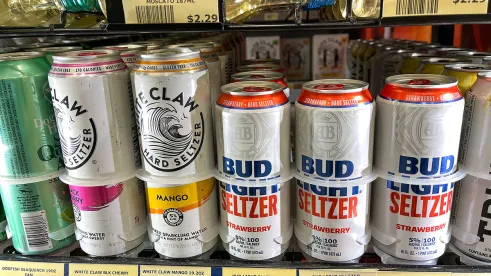On Nov. 5, 2021, Governor Tom Wolf signed into law House Bill 425, which became effective immediately. Inspired by the restaurant industry’s struggle to recover from the pandemic and related shifts in operations, the bill presents new opportunities for licensees by eliminating a major hurdle for licensing premises under a licensee’s control. In addition, it loosens many other limitations in the Liquor Code regarding catering permits and other provisions.
House Bill 425 Amendments to Liquor Code
This bill presents a unique licensing strategy that comes in the form of a temporary pandemic-related law. The Pennsylvania Liquor Control Board (the “Board”) may now temporarily extend the licensed premises of a licensed club, catering club, restaurant, retail dispenser, hotel, limited distillery, distillery, brewery, or limited winery to include any outside serving area that is immediately adjacent to the existing licensed area or within one thousand feet of the main licensed premises (even if the area to be temporarily licensed and the main licensed building are separated by a thoroughfare).
For decades, the Pennsylvania Liquor Control Board has “licensed” only premises contiguous or connected to each other. This rule has confounded new license applicants for decades, and operators that controlled both sides of a private driveway or public alleyway could not utilize their license for both sides of the thoroughfare. Any questions as to how the Pennsylvania Liquor Control Board would interpret these new provisions ended with the release of the Nov. 15, 2021 Summary of Act 81 of 2021 (House Bill 425).
In the Summary, the Board confirmed that separate premises across a public thoroughfare and within 1,000 feet of the licensed premises did not have to have their own service facilities, and a server could take food and drinks out of the original licensed premises and across the street to the new proposed licensed premises and serve patrons there. This is a remarkable change in the law; however, these provisions of Act 81 are due to sunset Dec. 31, 2024, which may affect the amounts a licensee may invest in temporary structures on premises that are not immediately connected or contiguous to the licensed premises.
Pandemic-Driven Amendments to Liquor Code
Another change in the law relates to off-premises catering permits. Restaurant licensees, hotel licensees, and eating place retail dispenser licensees that want to sell liquor away from their licensed premises can apply for and obtain an off-premises catering permit to hold a catered function on otherwise unlicensed premises. A catered function is defined as “the furnishing of food prepared on the premises or brought onto the premises already prepared in conjunction with alcoholic beverages for the accommodation of a person or an identifiable group of people, not the general public, who made arrangements for the function at least thirty days in advance.”
The limit for these permits was previously capped at 52 per year. Act 81 now allows the Board to issue an unlimited number of permits for off-premises catered functions to licensees that qualify. Catering permits are also no longer limited to the five-hour time restriction that was previously mandated.
The next amendment to the law pursuant to this bill applies to what happens when a licensee goes out of business. Now, liquor and wine in the possession of a licensee at the time the licensed business closes permanently may be sold to another licensee qualified to sell such products. The licensee selling the products is required to advise the Board in writing of the name of the licensee buying them, identifying any product sold, and describing the liquor, including brand names, sizes, and numbers of containers sold.
More in the House Bill 425
Lastly, Act 81 provides for an additional year of safekeeping for the following class of licensees that was in safekeeping during the proclamation of the 2020 disaster emergency related to the pandemic: club, catering club, restaurant, eating place retail dispenser, hotel, importing distributor, and distributor. A licensee in one of those classes cannot be subject to a renewal, validation, or safekeeping fee that would be due during the additional year. But the licensee must file a renewal or validation that does come due. The additional year of safekeeping commences on the renewal or validation date of a license that occurs after Dec. 31, 2021. This means any extension of the safekeeping period due before Dec. 31, 2021, must be paid, but that license would qualify for the one-year extension from 2022 to 2023.
The novel coronavirus has forced many businesses to change the way they operate, so it is gratifying to see the Pennsylvania Legislature create more flexibility in the Pennsylvania Liquor Code, one of the more confusing and rigid sets of laws in the United States.





 />i
/>i

